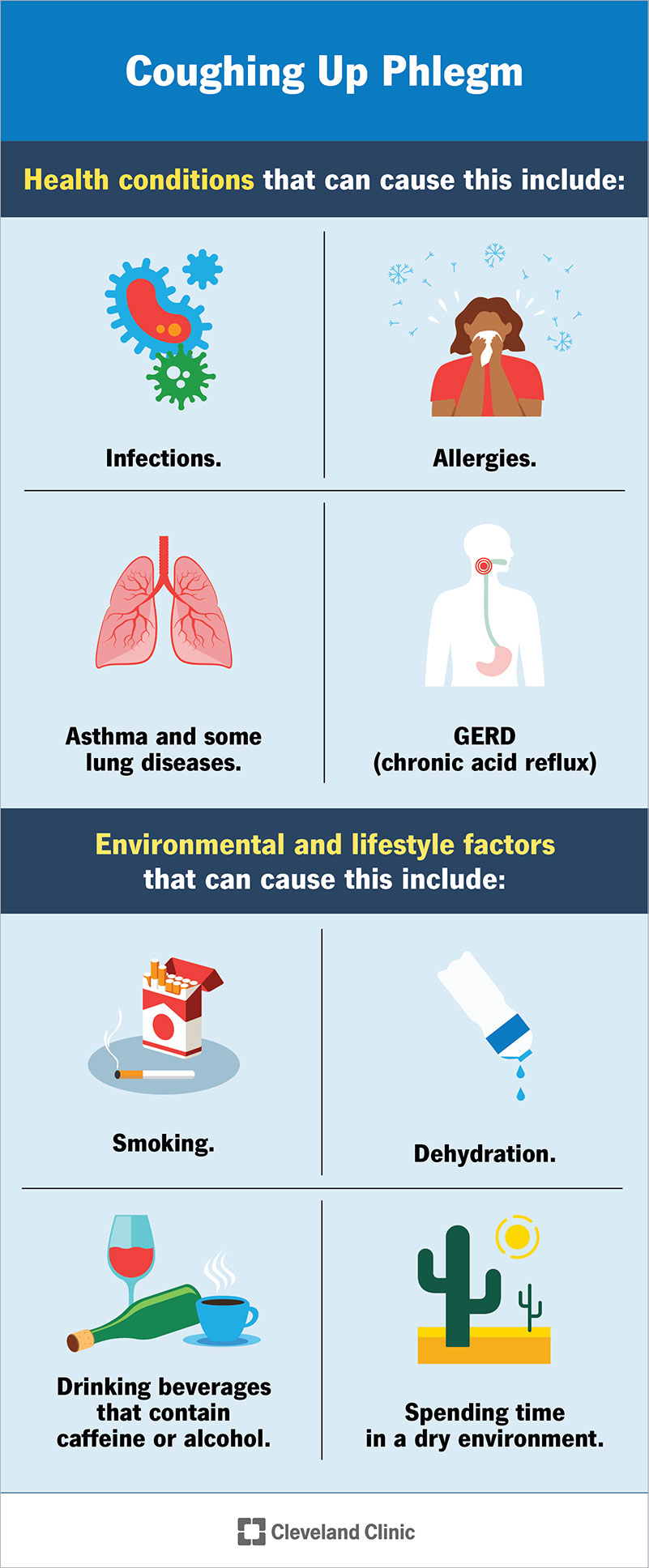Coughing up phlegm is a normal symptom of colds and other health conditions. But coughing up phlegm without feeling sick could indicate a more serious underlying issue like heart or lung disease.
Advertisement
Cleveland Clinic is a non-profit academic medical center. Advertising on our site helps support our mission. We do not endorse non-Cleveland Clinic products or services. Policy

Image content: This image is available to view online.
View image online (https://my.clevelandclinic.org/-/scassets/Images/org/health/articles/24636-coughing-up-phlegm)
Coughing up phlegm is a symptom of infections like the flu and common cold. Phlegm is a specific type of mucus that originates in your lungs and throat. It’s slightly thicker than the mucus that’s produced in your nose and sinuses. Another name for phlegm is sputum.
Advertisement
Cleveland Clinic is a non-profit academic medical center. Advertising on our site helps support our mission. We do not endorse non-Cleveland Clinic products or services. Policy
Most of the time, coughing up phlegm isn’t a cause for concern. It helps clear irritants and infections from your lungs. But if you cough up phlegm when you’re not feeling sick, it could mean you have a more serious underlying health condition. It can also tell you a lot about what’s going on with your body.
There are several health conditions — ranging from mild to severe — that can result in coughing up phlegm, including:
Certain environmental and lifestyle factors can contribute to coughing up phlegm, too, including:
Coughing up phlegm could mean different things depending on the color and consistency of the mucus. But you should always check with a healthcare provider if something doesn’t seem right.
If you’re coughing up clear phlegm, it usually means your body is trying to flush out pollen, pet dander or other allergens. However, in some cases, it could indicate a more serious condition, such as:
This usually means your body is fighting off some sort of infection. People often develop yellow phlegm in the early stages, and it turns green the longer the infection lingers. Possible health conditions related to coughing up yellow or green phlegm include:
Advertisement
White phlegm can mean a few different things, including:
Another name for black phlegm is melanoptysis. Common causes include:
When you see brown phlegm, rust-colored phlegm or phlegm with brown spots, it usually indicates old blood. Common related conditions include:
Coughing up bloody phlegm indicates a more serious issue. Common causes of red phlegm include:
If you cough up blood without phlegm, call a healthcare provider immediately or head to your nearest emergency room.
Treatment depends on the underlying cause. For instance, if you’re coughing up phlegm as a result of allergies, your healthcare provider may recommend decongestants, antihistamines or corticosteroids. If you have an infection, your provider may prescribe antibiotics. If GERD causes you to cough up phlegm, then you might need antacids or other medications that relieve acid reflux symptoms.
Your cough may go away on its own in a few days. But if you’ve been coughing up phlegm for two weeks or more and your symptoms haven’t improved, schedule an appointment with a healthcare provider.
Coughing up phlegm helps rid your body of allergens, irritants and infections. Here are some recommendations on how to cough up phlegm:
You should schedule an appointment with a healthcare provider if:
Yes. While the presence of mucus may indicate an underlying issue, coughing up phlegm is a good thing because it helps clear irritants, allergens and infections out of your system.
Advertisement
Currently, research suggests that most people who get COVID-19 develop a dry cough. However, as the virus worsens, some people may notice an increase in mucus production and may cough up phlegm as a result.
Coughing up phlegm is a good thing. But if your cough lasts longer than two weeks or if the phlegm is yellow, green, brown, black, white or red, you should schedule an appointment with a healthcare provider as soon as possible.
If you’re coughing up blood without phlegm, call a healthcare provider right away or go to your nearest emergency room.
Coughing up phlegm is unpleasant. Examining it, even more so. But phlegm can tell you a lot about what’s going on inside your body. If you cough up phlegm that’s yellow, green, brown, black, white or red — or if you cough up mucus for two weeks or longer, schedule a visit with your healthcare provider. They can find out what’s causing you to cough up phlegm and treat any underlying conditions.
Advertisement

Sign up for our Health Essentials emails for expert guidance on nutrition, fitness, sleep, skin care and more.
Learn more about the Health Library and our editorial process.
Cleveland Clinic’s health articles are based on evidence-backed information and review by medical professionals to ensure accuracy, reliability and up-to-date clinical standards.
Cleveland Clinic’s health articles are based on evidence-backed information and review by medical professionals to ensure accuracy, reliability and up-to-date clinical standards.
Need care fast? Cleveland Clinic’s Express Care and Urgent Care locations treat everything from sprains to sinus infections — no appointment needed.
